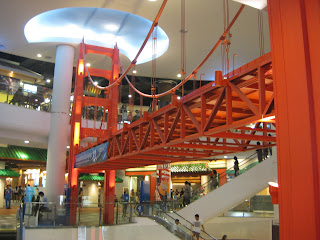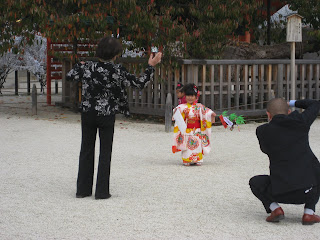
But that sort of legend has a way of inviting development. New hotels, businesses, and crowds that often stamp out the very beauty and atmosphere that brought them.
I always suspected that would happen here too. So I feel the need to return as often as possible before it's all gone. Each time I go back, I don't know quite what to expect.
Traveling there from Ko Lipe, however, was more challenging than I suspected. It turns out it's virtually impossible to get from Lipe to Ko Phangan in a single day, even if you're willing to spring for a plane ticket. This is mainly due to the ferry schedules to and from both islands.
I resigned to the fact that I was going to have to stay overnight somewhere along the way. I chose to stay over in Surat Thani rather than Krabi because it is closer to the ferries in the Gulf, and I figured I could get an earlier ferry that way.
A nasty rain storm greeted me and I took cover in the only backpacker hotel nearby. When I looked at the dirty, overpriced rooms, the bell boy made sure to let me know he could call a hooker over for me, and ensured I understood by miming the whole transaction. Classy.
Just as I was about to begrudgingly hand over $14 to the desk clerk, four other backpackers approached me and asked me if I wanted to share a five bed room with them. They seemed nice and were in the same boat as me. A frenchman, an Italian, a Russian, and an Aussie-American. They had all been on the same bus and had all just met each other.
I shrugged and said, "Why not." The seedy hotel got exactly zero dollars from me. And I made four new friends.
Big win.
It's funny how sharing a hotel room with a total stranger feels so natural when there are no other english speakers in sight. Back at home it would seem preposterous.
We only had to tolerate the crummy room for a few hours while we slept, and then made our way to the ferry first thing. The others were looking for a nice quiet beach to relax, so I talked three of them into checking out Thong Nai Pan with me, though with a warning that I didn't know exactly what we'd find.
After the two hour ferry ride and the bumpy forty minute jungle taxi, we were finally there.
The first thing I noticed was that the first two bungalow resorts on that end of the beach had been completely demolished, and there was new construction under way.

I had heard before I left for my trip that my favorite bungalows at the opposite end might not be operating either. And sure enough, they were closed down for repairs. But the same family operates the Thong Tapan resort next door, and had some beautiful, comfortable bungalows up the hill for 500 baht. So we moved in.
I noticed the I-Sea bar on the beach wasn't open. It seemed vacant with no bottles on the shelves or music playing. It's a favorite spot of mine, so I asked Boo, our guest hostess, "Does Stefano and his wife still operate the bar?" She said no, not anymore.
Sigh.
Little by little, I noticed things were missing from the little beach community. The Bamboo Hut, a great family restaurant, was shut down, though only temporarily. But other little spots that had held fond memories for me had been torn down entirely.
Asking around, I learned that the luxury Rasananda resort, which opened a couple of years ago, has actually always owned the majority of the beach front here and was renting the land to the backpacker bungalows that have dominated the beach until now. They have decided to take back the land and expand their $250 - $1000+ per night hotel.
As you might imagine, the type of clientele that spend one hundred times more to stay at the same beach might tend to change the atmosphere of the tiny village. These are folks who tend to stay in their resorts, use its spa, and eat and drink at its top notch restaurants. They don't go out for $2 noodle plates or patronize the little pancake dessert cart on the road, nor do they play pool at the expat bar on the beach.
So as a result, those businesses have largely closed, or moved elsewhere.

In the past, I had always been worried that the beach would be ruined by ugly development and annoying tourist merchant shops. But I had it wrong. The beach is as quiet and beautiful as ever. But the people changed. And that turned out to be just as distressing for me.
Beauty alone doesn't make a place feel like home.
I also learned something else about Ko Phangan. I had always thought Thailand had a single "high" tourist season from November to February. But that's not the case. There are three distinct climate regions in Thailand. And even though the Andaman coast is indeed in its high season, the Gulf region has an entirely different climate. And I had unknowingly chosen the rainiest month of the year, November, to come to Phangan.
Luckily, the days I spent here were mainly sunny and beautiful. I had planned to stay up to two weeks, but I knew I'd be pushing my luck with the weather if I stayed much longer and I felt a sense of sadness that so much of what I always liked about this place was gone.
I knew it wouldn't last forever. And I was right. It's still a lovely place to visit, and I expect I'll be back. But I'll come in January or February. And I'll bring some friends to hang out with.
My new friends decided to move on to a more lively part of the island. I considered following them, but decided it was time to see something new.
It's time to head to Burma.
 I have only a modest knowledge of geography.
I have only a modest knowledge of geography.


 But on this trip I got an invitation from my friend Leah to stay at her apartment in the
But on this trip I got an invitation from my friend Leah to stay at her apartment in the  It's about eight stories high, and when I got to the fourth floor, I had one of the most surreal experiences I have had during this trip.
It's about eight stories high, and when I got to the fourth floor, I had one of the most surreal experiences I have had during this trip. Everywhere I walked, I'd snap a picture of something that made me laugh. I know I looked funny to the other shoppers in the mall. Why did I care so much about the decorations?
Everywhere I walked, I'd snap a picture of something that made me laugh. I know I looked funny to the other shoppers in the mall. Why did I care so much about the decorations?






 Although the flight is a mere eleven hours, you still lose about two days on the calendar to get there. My flight out of SFO left around 10 am Wednesady, and I landed in Tokyo 4 pm
Although the flight is a mere eleven hours, you still lose about two days on the calendar to get there. My flight out of SFO left around 10 am Wednesady, and I landed in Tokyo 4 pm I barely remembered to write down detailed directions to
I barely remembered to write down detailed directions to  Well that was quick. I had no idea. It didn't look all that seedy. There were no girls in sight. Just a lot of drunken business men and regular looking restaurant facades.
Well that was quick. I had no idea. It didn't look all that seedy. There were no girls in sight. Just a lot of drunken business men and regular looking restaurant facades. Imperial Palace East Garden
Imperial Palace East Garden On my last evening before heading off to Kyoto, I met up with my friend
On my last evening before heading off to Kyoto, I met up with my friend